victory
Written by guest writer: Corrie Petersen

 What a difference a year can make. Today is my mom, Caryn Schulenberg’s birthday and I’m the lucky one to write her post this year. Every day and every year things change. We never know what to expect next, but that’s ok because surprises are always fun.
What a difference a year can make. Today is my mom, Caryn Schulenberg’s birthday and I’m the lucky one to write her post this year. Every day and every year things change. We never know what to expect next, but that’s ok because surprises are always fun.
This last year has been full of changes in our family. The true blessing is that my mom has been here to be a part of all the changes. She was able to help welcome two more great grandsons, courtesy of my two sons, Chris and Josh Petersen and their wives, Karen and Athena. She was able to take several vacations with my dad, Bob 
 Schulenberg and most recently she was able to help my great aunt, Sandy Pattan in her time of need.
Schulenberg and most recently she was able to help my great aunt, Sandy Pattan in her time of need.
While I’m sure she didn’t plan to be a caregiver again, she wouldn’t have it any other way. Caregiving is in her heart, and she is very good at it, I might add. She was a caregiver for a very long time with her parents, Allen and Collene Spencer; my dad’s parents, Walt and Joann Schulenberg; and sister, Brenda Schulenberg. I have to wonder if choosing to help my Great Aunt Sandy was a blessing in disguise for both of them…a time of victory, healing, and reconnection.

 Mom has been retired for five years now, and she is still so busy. She finds time to walk nine miles every day, write her daily blog posts, read her Bible and go to church, and spend time with her family. She and my dad go to the Black Hills over the Independance Day week to go hiking, and they take a trip to Thermopolis each year around the time of their anniversary. They also try to get to Washington every other year to visit my sister, Amy Royce, her husband Travis, and her kids, Shai and Caalab. Oh…and she bowls once a week with my dad. Boy, that makes me tired just thinking about it, but that’s her life and she wouldn’t want it to be any different.
Mom has been retired for five years now, and she is still so busy. She finds time to walk nine miles every day, write her daily blog posts, read her Bible and go to church, and spend time with her family. She and my dad go to the Black Hills over the Independance Day week to go hiking, and they take a trip to Thermopolis each year around the time of their anniversary. They also try to get to Washington every other year to visit my sister, Amy Royce, her husband Travis, and her kids, Shai and Caalab. Oh…and she bowls once a week with my dad. Boy, that makes me tired just thinking about it, but that’s her life and she wouldn’t want it to be any different.
Today is my mom’s birthday and I hope she has the best day ever. I love you to the moon and back, mom.
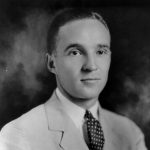
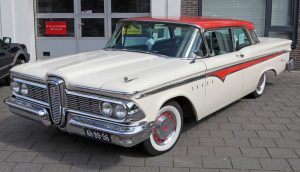 Despite having a domineering father, who was never pleased with anything he did, Edsel Ford, the son of the founder of Ford Motors is mainly remembered for the Edsel, a failed 1958-60 car model. In reality, he was one of the masterminds of the Allied victory in World War II. Against the wishes of his father, Edsel Ford telephones William Knudsen of the U.S. Office of Production Management on June 12, 1940, to confirm Ford Motor Company’s acceptance of Knudsen’s proposal to manufacture 9,000 Rolls-Royce-designed engines to be used in British and United States airplanes. In all, they would build, 9,000 B-24 Liberator bombers, 278,000 Jeeps, 93,000 military trucks, 12,000 armored cars, 3,000 tanks, and 27,000 tank engines, but it was not without a few stumbling blocks. Edsel and Charles Sorensen, Ford’s production chief, had apparently gotten the go-ahead from Henry Ford by June 12, when Edsel telephoned Knudsen to confirm that Ford would produce 9,000 Rolls-Royce Merlin airplane engines (6,000 for the RAF and 3,000 for the U.S. Army). However, as soon as the British press announced the deal, Henry Ford personally and publicly canceled it, telling a reporter: “We are not doing business with the British government or any other government.”
Despite having a domineering father, who was never pleased with anything he did, Edsel Ford, the son of the founder of Ford Motors is mainly remembered for the Edsel, a failed 1958-60 car model. In reality, he was one of the masterminds of the Allied victory in World War II. Against the wishes of his father, Edsel Ford telephones William Knudsen of the U.S. Office of Production Management on June 12, 1940, to confirm Ford Motor Company’s acceptance of Knudsen’s proposal to manufacture 9,000 Rolls-Royce-designed engines to be used in British and United States airplanes. In all, they would build, 9,000 B-24 Liberator bombers, 278,000 Jeeps, 93,000 military trucks, 12,000 armored cars, 3,000 tanks, and 27,000 tank engines, but it was not without a few stumbling blocks. Edsel and Charles Sorensen, Ford’s production chief, had apparently gotten the go-ahead from Henry Ford by June 12, when Edsel telephoned Knudsen to confirm that Ford would produce 9,000 Rolls-Royce Merlin airplane engines (6,000 for the RAF and 3,000 for the U.S. Army). However, as soon as the British press announced the deal, Henry Ford personally and publicly canceled it, telling a reporter: “We are not doing business with the British government or any other government.”
Unlike other automakers, Ford had already built a successful airplane in the 1920s called the Tri-Motor. That fact made them the logical choice when the war effort needed more planes. In two meetings in late May and early June 1940, Knudsen and Edsel Ford agreed that Ford would manufacture the new fleet of aircraft for the RAF on an expedited basis. The one significant obstacle was Edsel’s father Henry Ford, who still retained complete control over the company he founded, even though he had turned the figurehead control over to his son. Henry Ford was well known for his opposition to the possible U.S. entry into World War II, so it would be up to Edsel to convince him that it was necessary.
According to Douglas Brinkley’s biography of Ford, “Wheels for the World,” Henry Ford had in effect already accepted a contract from the German government. The Ford subsidiary Ford-Werke in Cologne was doing business with the Third Reich at the time, which Ford’s critics took as proof that he was concealing a pro-German bias behind his claims to be a man of peace. Nevertheless, as U.S. entry into the war became more of 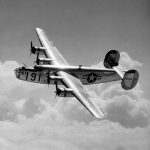
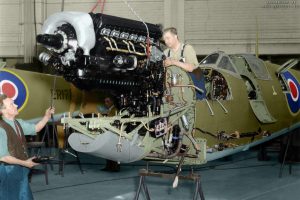 a certainty, Ford reversed his position, and the company opened a large new government-sponsored facility at Willow Run, Michigan in May of 1941, for the purposes of manufacturing the B-24E Liberator bombers for the Allied war effort. Ford Motor plants also produced a great deal of other war materiel during World War II, including a variety of engines, trucks, jeeps, tanks and tank destroyers. The production needs met by Ford Motor Company during World War II were instrumental in the Allied victory in that war.
a certainty, Ford reversed his position, and the company opened a large new government-sponsored facility at Willow Run, Michigan in May of 1941, for the purposes of manufacturing the B-24E Liberator bombers for the Allied war effort. Ford Motor plants also produced a great deal of other war materiel during World War II, including a variety of engines, trucks, jeeps, tanks and tank destroyers. The production needs met by Ford Motor Company during World War II were instrumental in the Allied victory in that war.
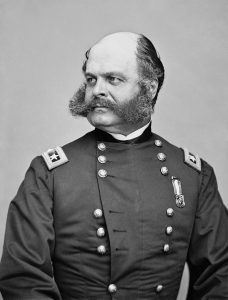 Those who have studied the Civil War, or know much about the United States at all, know that the Civil War was won by the Union, but that does not mean that there weren’t battles that they lost. There are very few wars that are lopsided in their battle field victories. One such battle was the Battle of Fredericksburg. On December 11, 1862, Ambrose Burnside, newly placed in command of the Army of the Potomac, planned to cross the Rappahannock River in Virginia with over 120,000 troops. When he finally crossed it, two days later, on December 13, 1862, he confronted 80,000 troops of Robert E Lee’s Confederate Army at Fredericksburg. With 200,000 combatants, this was the largest concentration of troops of any Civil War Battle. It was also one of the battles the Union Army would lose. In a crushing defeat, the Union Army suffered nearly 13,000 casualties, while the Confederate Army only lost 5,000.
Those who have studied the Civil War, or know much about the United States at all, know that the Civil War was won by the Union, but that does not mean that there weren’t battles that they lost. There are very few wars that are lopsided in their battle field victories. One such battle was the Battle of Fredericksburg. On December 11, 1862, Ambrose Burnside, newly placed in command of the Army of the Potomac, planned to cross the Rappahannock River in Virginia with over 120,000 troops. When he finally crossed it, two days later, on December 13, 1862, he confronted 80,000 troops of Robert E Lee’s Confederate Army at Fredericksburg. With 200,000 combatants, this was the largest concentration of troops of any Civil War Battle. It was also one of the battles the Union Army would lose. In a crushing defeat, the Union Army suffered nearly 13,000 casualties, while the Confederate Army only lost 5,000.
People might think that Burnside was not much of a commander, but it should be mentioned that this was the first time he had commanded an army. He was a graduate of West Point, had risen quickly up the ranks, and had seen action in several battles prior to this fateful day. Abraham Lincoln had approached him about taking control of the Union’s Army. He hesitated, partly out of loyalty to the current commander and former classmate, and partly because he was unsure of his own ability. In the end the prior commander’s failure assured that he was on the way out, and rather than have Major General Joseph Hooker, a fierce rival, pass him up, Burnside accepted the commission on November 7, 1862.
Knowing that he had to have the element of surprise, Burnside came up with a plan to confront Lee’s Army of Northern Virginia at Fredericksburg. He planned to move his forces to the banks of the neighboring Rappahannock River, and then transport his men across by way of hastily assembled pontoon bridges, and surprise the enemy. Lincoln was impressed with the audacity of the plan and approved it, but expressed doubts about its potential for success. Burnside swung into action, reaching the banks of the Rappahannock by November 19, 1862. We will never know if the plan might have succeeded, if some Union generals, including Winfield Scott Hancock, who believed the river could be crossed without the boats, had sent the boats…but instead, they urged Burnside to act without them. Burnside, who believed the river was too swift and deep, refused. They waited a week for the boats…unfortunately, under the watchful eyes of the Confederate scouts.
The element of surprise was gone. When they finally began building the pontoon bridges, the Confederate Army opened fire. Burnside began a massive bombardment of Fredericksburg, in the first shelling of a city in the Civil War. They were able to hold back the Confederate Army long enough to finish the bridges, and then they rushed across the river. Two days later, Burnside ordered his left flank to attack Lee’s right, in the hopes that Lee would have to divert forces to the south of the city, leaving the center and Marye’s Heights vulnerable. For a few hours, it looked like this might actually work. General George Meade broke through “Stonewell” Jackson’s line, but the Union failed to send in enough reinforcements to prevent a successful Confederate counterattack. Lee was able to keep James Longstreet’s men in position at Marye’s Heights, where they decimated Union forces. Burnside lost eight men for every Confederate soldier lost there. Though Burnside briefly considered another assault, the battle was over. The Union had suffered nearly 13,000 casualties while the Confederates lost fewer than 5,000. They needed to regroup before attacking again.
Burnside was an unpopular commander, partly I’m sure, because he felt the need to rush into things without really planning them out. His feelings of inadequacy proved to be his downfall. As he was planning his next attack, some of his leaders went to President Lincoln to voice their concerns. In the end, Lincoln halted the attack. On January 20, 1983, Burnside was ready to go again, but again the pontoon bridges were delayed. The weather didn’t help things either. What had been a dry January turned rainy, and the roads were all but impassible. Troops that had covered 40 miles a day on their way to Fredericksburg now struggled to get further than a mile. For three days, Burnside’s troops continued their disastrous slog on what would become known as the “Mud March,” accompanied most of the way by jeering Confederate forces taunting them from dry land. Five days after his offensive began, it was over…and so was Burnside’s brief, six week stint as commander of the Army of the Potomac. Lincoln immediately removed him from command, replacing him with the very person he feared it would be…Joseph Hooker.
Fredericksburg was the low point in the war for the North, but the South was ecstatic. Burnside probably should have stuck to his side career…weaponry design. And that was what he went back to. He retired in 1853 and in 1856 received his first patent for a .54 caliber breech loading firearm. Impressed with the carbine’s performance, the U.S. Army awarded the Bristol Firearm Company in Rhode Island…where Burnside worked…with a $100,000 contract. The order was soon rescinded, however, under shady circumstances. It’s believed that a rival munitions company bribed the army ordinance department to switch suppliers. Burnside’s bad luck continued the next year when a failed bid for a Congressional seat, followed closely by a fire that destroyed the Bristol factory, forced the financially strapped Burnside to sell his patents. Others would reap the rewards 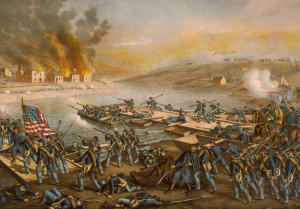 when, at the start of the Civil War, demand for his creation soared. By 1865, more than 55,000 carbines had been ordered, and the Burnside had become one of the most popular Union weapons of the war, second only to the Sharp carbine and my ancestor, Christopher Spencer’s Spencer carbine.
when, at the start of the Civil War, demand for his creation soared. By 1865, more than 55,000 carbines had been ordered, and the Burnside had become one of the most popular Union weapons of the war, second only to the Sharp carbine and my ancestor, Christopher Spencer’s Spencer carbine.
Burnside would eventually have a claim to fame, but it would not be for war or weapons. Burnside liked to wear his facial hair in what was an unusual way for the times. He had a bushy beard and moustache along with a clean-shaven chin. These distinctive whiskers were originally dubbed “burnsides,” but later the term would be altered and would become “sideburns.”
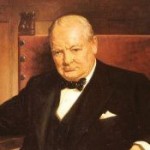 Over the thousands of years since man has been on the Earth, amazing people, as well as evil people, have made memorable speeches. Some speeches were never expected to be memorable or historic, and others were expected to be so, because they were designed to be uplifting, inspirational, morale building, or a tribute filled with gratitude. It was the latter that inspired Sir Winston Spencer Churchill to make his speech on August 20, 1940. Europe was entrenched in World War II and things weren’t going as well as they had hoped. They had taken a few rather large beatings from the Germans, and morale was not as high as they had hoped. The speech was given as the United Kingdom prepared for the expected German invasion. After a series of defeats for the Allies over the prior months, Churchill was trying to tell the people that they were in a much better position now. He was correct, of course. Shortly after the speech, the British won the battle, the first significant defeat for the previously unstoppable Wehrmacht.
Over the thousands of years since man has been on the Earth, amazing people, as well as evil people, have made memorable speeches. Some speeches were never expected to be memorable or historic, and others were expected to be so, because they were designed to be uplifting, inspirational, morale building, or a tribute filled with gratitude. It was the latter that inspired Sir Winston Spencer Churchill to make his speech on August 20, 1940. Europe was entrenched in World War II and things weren’t going as well as they had hoped. They had taken a few rather large beatings from the Germans, and morale was not as high as they had hoped. The speech was given as the United Kingdom prepared for the expected German invasion. After a series of defeats for the Allies over the prior months, Churchill was trying to tell the people that they were in a much better position now. He was correct, of course. Shortly after the speech, the British won the battle, the first significant defeat for the previously unstoppable Wehrmacht.
Times of war are often when great men make speeches to inspire the military troops to persevere. They can be a battle cry of sorts. Or they can be a reflection of such deep gratitude that it leaves us awestruck. Churchill was first moved to utter those famous words upon his exit from the Battle of Britain Bunker at RAF Uxbridge on August 16, 1940. He had been the Number 11 Group RAF Operations Room during a day of battle. Afterwards, Churchill told Major General Hastings Ismay, “Don’t speak to me, I have never been so moved.” His emotions were so deep, that he had to think about this for a time. The two were silent for a few moments, and then Churchill said, “Never in the field of human conflict has so much been owed by so many to so few.” That declaration became the basis of his speech to the House of Commons on August 20, 1940.
In his speech, Winston Churchill said, “The gratitude of every home in our Island, in our Empire, and indeed throughout the world, except in the abodes of the guilty, goes out to the British airmen who, undaunted by odds, unwearied in their constant challenge and mortal danger, are turning the tide of the World War by their prowess and by their devotion. Never in the field of human conflict was so much owed by so many to so few. All hearts go out to the fighter pilots, whose brilliant actions we see with our own eyes day after day, but we must never forget that all the time, night after night, month after month, our bomber squadrons travel far into Germany, find their targets in the darkness by the highest navigational skill, aim their attacks, often under the heaviest fire, often with serious loss, with deliberate, careful discrimination, and inflict shattering 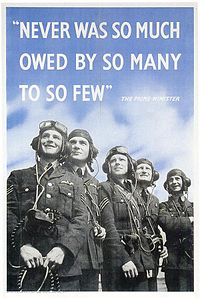 blows upon the whole of the technical and war-making structure of the Nazi power. On no part of the Royal Air Force does the weight of the war fall more heavily than on the daylight bombers who will play an invaluable part in the case of invasion and whose unflinching zeal it has been necessary in the meanwhile on numerous occasions to restrain…”
blows upon the whole of the technical and war-making structure of the Nazi power. On no part of the Royal Air Force does the weight of the war fall more heavily than on the daylight bombers who will play an invaluable part in the case of invasion and whose unflinching zeal it has been necessary in the meanwhile on numerous occasions to restrain…”
Words can be so powerful. They have the power to change the course of history when they are used to inspire soldiers in battle to a victory that seemed impossible just moments before the words were spoken. Sometimes, all it takes to bring about a victory is to listen to the one person who sees that victory, no matter how many defeats have preceded it, is still possible. Great men…men who have inspired victory…have been around a long time. These men, and women too, refuse to accept defeat. And they have the ability to speak powerfully to convince others that victory can follow defeat.
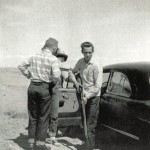 You have heard that for everything there is a season, and that is true in so many ways. One that I doubt if you ever thought about, is the seasons for things we do. Now this isn’t going to be a serious story about philosophical things, but rather it will follow a little bit different path. Typically, for most men, there is football season, baseball season, basketball season, and hunting season, with a few others thrown in there for some people. In times past, most women would have left this to the men, but that has changed, as there are probably an almost equal amount of women that like to do these things too.
You have heard that for everything there is a season, and that is true in so many ways. One that I doubt if you ever thought about, is the seasons for things we do. Now this isn’t going to be a serious story about philosophical things, but rather it will follow a little bit different path. Typically, for most men, there is football season, baseball season, basketball season, and hunting season, with a few others thrown in there for some people. In times past, most women would have left this to the men, but that has changed, as there are probably an almost equal amount of women that like to do these things too.
As to the season for hunting…which I think just got over…but since my husband and I don’t hunt, I can’t say for sure. I do know that for years my parents went hunting, and I can remember the wild meat…cooked to perfection by my mom. It was so good. Not everyone can cook wild meat to make it not taste gamey, but she could. They went hunting with my grandparents, and I know that my uncles did too.  Especially as young men. I doubt if my aunts went, as girls anyway, but I could be wrong on that. I do know that a lot of my cousins hunt…both male and female cousins, so it is something that runs in our family on both sides. Lots of the girls like to go hunting with their husbands, but the thing I find especially endearing are the girls who like to go hunting with their dads, such as my cousin, Jamie Patsie, who was not deterred when her husband Kevin couldn’t go hunting with her. She just talked to her dad, Terry Limmer, and the two of them made a day of it. That is such a cool thing too, because it gave them some father/daughter time.
Especially as young men. I doubt if my aunts went, as girls anyway, but I could be wrong on that. I do know that a lot of my cousins hunt…both male and female cousins, so it is something that runs in our family on both sides. Lots of the girls like to go hunting with their husbands, but the thing I find especially endearing are the girls who like to go hunting with their dads, such as my cousin, Jamie Patsie, who was not deterred when her husband Kevin couldn’t go hunting with her. She just talked to her dad, Terry Limmer, and the two of them made a day of it. That is such a cool thing too, because it gave them some father/daughter time.
The little girls in the family maybe can’t go hunting with their dads yet, but that certainly didn’t stop Meadow Nordquist from going out to see what her dad, Aron had shot, and even taking the opportunity to pose for a victory shot with him. She was very excited about her dad’s conquest. I think her sister, Addie was a little put off by the idea of sitting on a dead animal, so she would have none of this whole “picture with her dad’s conquest” thing. I suppose the time will come when she will think differently about that. It may be with her husband, and then her dad though. Time will tell on that, but little  Meadow was very excited to see what her dad had shot…and I’m sure they will all enjoy the meat.
Meadow was very excited to see what her dad had shot…and I’m sure they will all enjoy the meat.
Like every other season, hunting has a season, and when that season is over, it’s over. I’m sure it is something everyone hates to have happen…especially if their hunt was not successful, but it is inevitable nevertheless. So, all I can say to that is that it is a good thing that football season is still going on, and basketball season will follow, and baseball after that. Before they know it, hunting season will be upon them again, and they will be back out there looking for the best buck. That’s just the way it is…to everything there is a season.
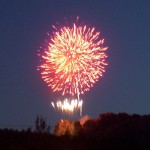 Today is our nations birthday. We are now 235 years old. Quite an accomplishment, but still young in the world’s view. There are many nations who are much older than the United States of America, but few that have done as much for the world and the nations in it. I am proud to be a citizen of this great nation. We are a nation who has fought for the rights of other countries around the world. We are a nation who doesn’t like to see innocent people being slaughtered at the hands of some crazed dictator or terrorist. We stand up for the rights of people around the world. That is something to be proud of.
Today is our nations birthday. We are now 235 years old. Quite an accomplishment, but still young in the world’s view. There are many nations who are much older than the United States of America, but few that have done as much for the world and the nations in it. I am proud to be a citizen of this great nation. We are a nation who has fought for the rights of other countries around the world. We are a nation who doesn’t like to see innocent people being slaughtered at the hands of some crazed dictator or terrorist. We stand up for the rights of people around the world. That is something to be proud of.
Like most people my family will attend the fireworks displays to be held tonight, some of us in Casper, and some of us in Custer. I know that many people just think of the fireworks as a fun thing to do, but it is really a way to remember. The fireworks look similar to the rockets that were fired during the fighting in the Revolutionary War, when we were fighting for freedom from English rule. So inspiring was the bravery of our men who were willing to give their lives for our freedom, that the fighting moved Francis Scott Key to write the “Star-Spangled Banner” part of which goes like this, “And the rockets’ red glare, the bombs bursting in air, gave proof thro’ the night that our flag was still there” It is with that in mind that we should watch the fireworks displays tonight. Remembering what was at stake, and really still is every day. There are threats to our security, our stability, our peace of mind every day. We have to stand up for these things as much today as they did back then.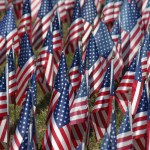
I’m not saying that we shouldn’t be happy. We should, because even though we are remembering a battle, we are celebrating the victory in that battle. We won!!! So this is a celebration!! But, it is also a reminder of a very important event in our nations history…the most important really…the day we became a nation…independent and free. So when you are out there tonight, watching the great fireworks displays, be sure to take just a moment to remember what they represent. A deadly fight for our freedom, and a country of people will to fight to keep our nation, the land of the free, and the home of the brave.

